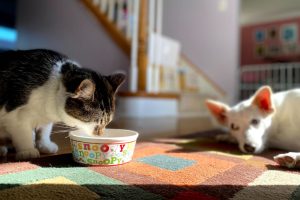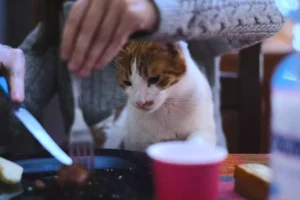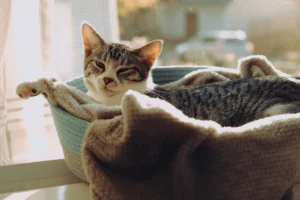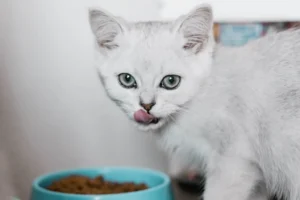Disclosure: We may earn a commission from helpful, relevant links in our content. No cost to you. See our privacy policy.
Ensuring your cat’s dietary needs are met can be challenging, but understanding the differences in pet food is crucial. Curious cat owners often wonder if rabbit food is safe for their feline friends, especially when trying to provide a varied and nutritious diet.
In this blog post, we’ll dive deeper into feline nutrition and help you make the best dietary choices for your fur baby.
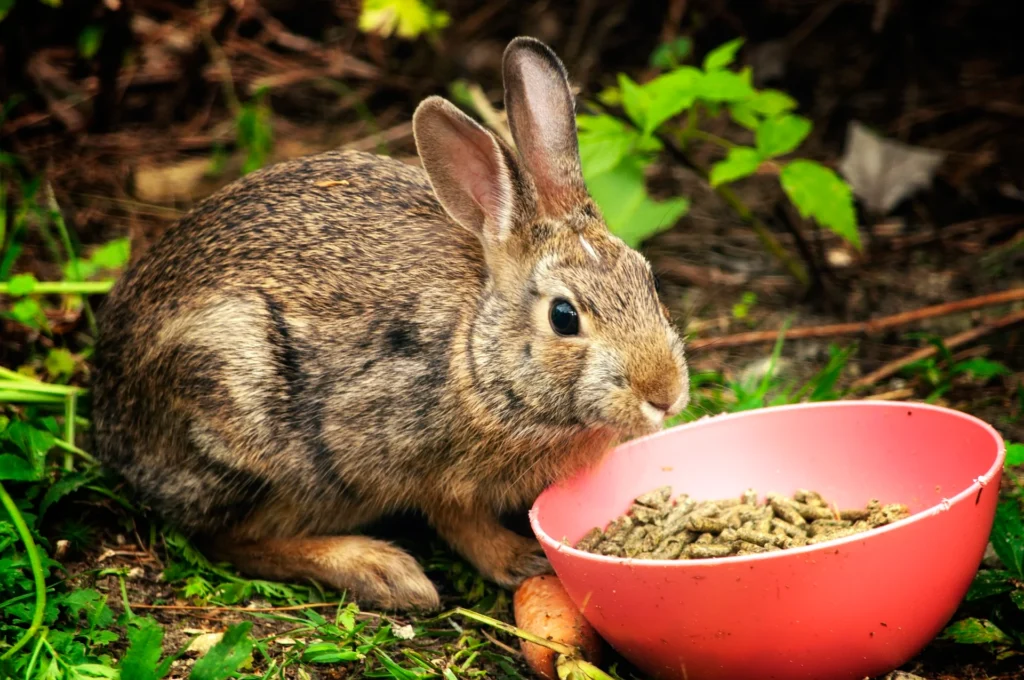
Feline Nutrition 101: What Do Cats Really Need?
To provide optimal nutrition for your cat, it’s essential to understand their basic dietary needs.
Cats are obligate carnivores, meaning they primarily rely on animal-based proteins to thrive. They require specific nutrients, like taurine, an amino acid found in meat, which is crucial for heart function, vision, and reproduction.
Cats also need other essential nutrients, such as arachidonic acid and vitamin A, which cannot be obtained from plant-based sources.
Just like dog food is only for dogs, cat food should only be given to cats.
Comparing Rabbit Food and Cat Food Ingredients
To understand the differences between rabbit food and cat food, it’s important to take a closer look at their ingredients. Below, we’ll break down the primary components of both types of pet food and highlight why rabbit food is not suitable for cats.
Protein Sources
- Rabbit food typically contains plant-based protein sources such as alfalfa and soybean meal, as rabbits are herbivores. These proteins are not ideal for cats, as they are unable to properly digest and absorb essential nutrients from plant-based ingredients.
- Cat food primarily consists of animal-based proteins like chicken, beef, or fish. As obligate carnivores, cats require these protein sources for optimal health and to obtain vital amino acids like taurine.
Carbohydrate Content
- Rabbit food is high in carbohydrates, including various grains and fibers, which are crucial for rabbit digestion. However, cats have a limited ability to metabolize carbohydrates, and a high-carb diet can lead to obesity and other health issues in felines.
- Cat food usually contains fewer carbohydrates than rabbit food, as cats have evolved to obtain their energy primarily from proteins and fats. Some cat foods do include carbohydrates, but these are typically added as a source of energy and should be kept to a minimum in a cat’s diet.
Essential Nutrients
- Rabbit food lacks several essential nutrients required by cats, such as taurine, arachidonic acid, and vitamin A. These nutrients are not present in plant-based ingredients, which can lead to deficiencies and serious health problems in cats.
- Cat food is specifically formulated to meet feline nutritional needs, providing all the essential nutrients required for a cat’s overall health. This includes the addition of taurine, vitamin A, and arachidonic acid, which are not found in rabbit food.
In conclusion, rabbit food is not suitable for cats due to the significant differences in ingredient composition and nutritional content. Feeding your cat rabbit food may lead to nutritional deficiencies and health problems, as it lacks the essential nutrients that felines require.
It’s crucial to provide your cat with a balanced diet formulated specifically for their species to ensure their health and well-being.
The Verdict: Is Rabbit Food Safe for Cats?
Rabbit food is not considered safe for cats due to its inadequate nutritional content for feline needs. Cats require a diet rich in animal-based proteins and specific nutrients that rabbit food simply cannot provide.
Offering your cat a diet tailored to their species is crucial for maintaining their health and well-being.
Risks of Feeding Rabbit Food to Your Cat
Feeding your cat rabbit food can lead to several health risks, as it lacks essential nutrients and has an inappropriate balance of protein, carbohydrates, and fats for felines. Some of the potential risks include:
- Nutritional deficiencies. Rabbit food lacks vital nutrients like taurine, vitamin A, and arachidonic acid, which are essential for cats. These deficiencies can cause severe health problems such as heart disease, vision impairment, and immune system issues.
- Obesity and diabetes. Rabbit food is high in carbohydrates, which are not efficiently metabolized by cats. A high-carb diet can contribute to obesity, which in turn increases the risk of developing diabetes and other related health issues.
- Gastrointestinal problems. Cats have a shorter digestive tract designed for processing animal-based proteins. Consuming plant-based proteins and fibers found in rabbit food can lead to digestive issues such as diarrhea, vomiting, or constipation.
- Poor coat condition. Cats require specific nutrients, like arachidonic acid and certain amino acids, for maintaining a healthy coat. Feeding rabbit food can result in a dull, dry coat and even hair loss due to nutritional deficiencies.
To avoid these risks, it’s essential to provide your cat with a nutritionally balanced diet specifically formulated for their species. This will ensure they receive all the necessary nutrients for a healthy and happy life.
Might be interested in: Raw Cat Food Pros & Cons
Safer Alternatives for Feline Nutrition
Instead of feeding your cat rabbit food, it’s crucial to provide them with a well-balanced, species-appropriate diet.
Commercially available cat foods, both wet and dry, are designed to meet the unique nutritional requirements of felines. As you wait for our guide on best cat foods, try these best wet cat foods on Amazon, or this best dry foods. You can get these from Chewy as well.
When I noticed my male cat Smokey’s coat starting to look dull and lifeless, I quickly realized that his diet was lacking in essential nutrients. After consulting with my vet, I switched Smokey to a high-quality, grain-free cat food, and his coat soon regained its shine and softness.
For those interested in homemade diets, consider consulting a veterinary nutritionist to ensure your cat receives all the necessary nutrients in the correct proportions.
Remember, a healthy diet is the foundation of your cat’s overall well-being. Often it’s the mix of dry and wet cat food that brings the best results.
FAQs
Can cats eat rabbit food occasionally as a treat?
Cats should not be given rabbit food even as an occasional treat, as it lacks the necessary nutrients and can cause digestive issues.
Are there any specific rabbit food ingredients toxic to cats?
While rabbit food ingredients may not be directly toxic to cats, they are inappropriate for feline consumption due to the high carbohydrate content and lack of essential nutrients.
How can I ensure my cat’s diet is nutritionally balanced?
Choose high-quality commercial cat food that meets the AAFCO (Association of American Feed Control Officials) guidelines, or consult a veterinary nutritionist if you prefer a homemade diet.
What are the signs of poor nutrition in a cat?
Signs of poor nutrition in cats can include a dull or dry coat, hair loss, weight loss, lethargy, weakened immune system, and gastrointestinal issues such as vomiting or diarrhea.
Alex, a passionate animal lover, has experience in training and understanding animal behavior. As a proud pet parent to two dogs and three cats, he founded AnimalReport.net to share insights from animal experts and expand his knowledge of the animal kingdom.


